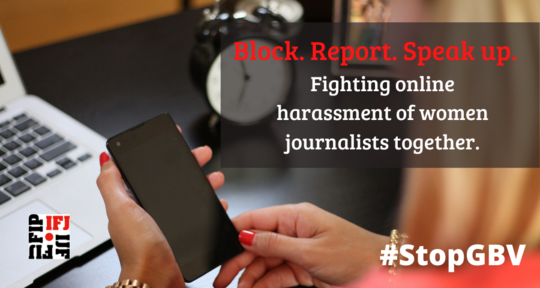Online bullying, doxxing, threats and sexual harassment are serious problems that impact female journalists in the course of their work. Abuse on social media has led many female journalists to close their accounts and remain silent. Those identified as LGBTQIA+ and persons of color have been specifically targeted.
According to IFJ statistics, 44% of women journalists have experienced some form of harassment online.
Bullying is any behaviour that the bully knew – or ought to have known – would humiliate, intimidate or demean another person.
Sexual harassment is generally defined as unwelcome sexual conduct or comments.
Doxxing: Occurs when your personal information –such as an address or phone number – is posted online without your consent
Threats: Occur when someone threatens you or your family with a specific attack.
Hate speech: Expression that attacks a specific aspect of a person’s identity, such as their race, ethnicity, gender identity, religion, sexual orientation, disability.
1. Identify the abuse: PEN America collected a glossary of terms on online abuse. What kind of abuse are you suffering from? Sexual harassment, hateful speech, threats?
Check also trollbuster’s useful infographics on this issue.
2. Document the abuse. Document everything (when, how many times, who), take screenshots and make notes. If the harassment is criminal in nature, consider reporting it to the authorities.
3. Protect yourself. On Facebook, unfriend, block and report the person. On Twitter unfollow, block and report the Tweet by clicking on the “more options” icon on each Tweet. Change your Twitter settings so you just see what you want and avoid as much as possible "low quality" interactions. On Instagram, make your account private, block unwelcomed followers, prevent third party apps from getting your data (read this article from The Verge).
4. Strengthen your cybersecurity: Change passwords, adopt protective software, find out what data about you exists online, use VPN to protect your location. Find more about security tips by journalism.co.ukhere.
5. . Assess your personal safety: is there a personal connection to the abuse? Are there direct and specific threats? What do your harassers know about you (e.g. address)?
6. Speak out and get support: tell your friends, family, colleagues; if work-related, let your employer know, they can provide mental health care or legal counsel ( share your documents, explain the impact on your life, use the DART Center resources to qualify your psychism, be specific about what you are asking for)
7. Demand action from the government. Write to your federal/state elected representatives, demanding tougher regulations that force social media companies like Facebook and Twitter to act quickly to remove bullying and harassing content from their online platforms.
8. Demand action from social media moguls. Message Facebook/Instagram CEO Mark Zuckerberg on Facebook, demanding his company do better at protecting women from online bullying and sexual harassment. Tag Twitter CEO Jack Dorsey @jack or send him a DM, demanding his company do better at protecting women from online bullying and sexual harassment.

